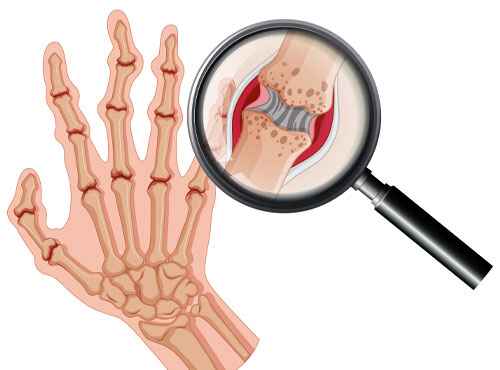Treatment of Rheumatoid Arthritis in Ayurveda
Ayurvedic Remedies, Therapies, and Advice for All Your Health Issues, Recommended by Expert Health Professionals
WHAT IS RHEUMATOID ARTHRITIS?

Rheumatoid arthritis or RA is an autoimmune disorder triggered by the body’s own immune system. When this happens, the body starts to attack the body’s healthy cells and tissues. The result is inflammation or swelling in the areas affected. The condition affects a person in more than one way. Likely, the condition affects your skin, nerve tissue, salivary glands, blood vessels, bone marrow, lungs, and heart.
For instance, if joint your one leg is affected, the joint in the other leg is affected too. So, RA can be differentiated from the other forms of arthritis, such as osteoarthritis. In a joint with rheumatoid arthritis, the lining of the joint causes damage to the tissues. This damage could last longer and lead to deformity.
Symptoms
With RA, the signs and symptoms develop in periods known as flares or exacerbations. Other times the symptoms disappear, which is known as the period of remission.
Usually, you can notice:
- Tender, warm, and swollen joints
- Joint stiffness that gets worse in the mornings and after inactivity
- Fatigue
- Fever
- Loss of appetite
Initially, RA tends to affect only one joint. The joints that attach your fingers to your hands and your toes to your feet are affected mostly. As signs spread to other parts, wrists, elbows, hips, shoulders, pain may radiate to the different regions.
However, it may also happen that your joints are affected, you have no indicative signs to diagnose RA.
When to see a doctor
Seek immediate support from your doctor if you feel discomfort and swelling in your joints.
Causes
RA occurs when an impaired immune system attacks the lining of the membranes and tissues that adjoint your joints. Due to this immune system attack, inflammation may result in the hardening of the synovium, a soft tissue that lines up the inner surface of the joints. This is further harmful because the cartilage and bone within the joints get damaged.
Yet, researchers are not sure of the exact cause of the inflammation. Many studies have confirmed it to be a source of genetic influence. But this does not imply that genes cause RA; however, they make you susceptible to infections with viruses or bacteria that may trigger the disease.
Over time, RA can make you prone to other medical problems- such as heart, eyes, skin, nerves, and lungs.
Risk Factors
Factors that may increase your risk of RA include:
- Gender. Women are likely to get RA than men.
- Age. Though RA can occur at any age, most instances are found in middle age.
- Smoking: If you have a genetic predisposition for developing the disease, smoking further adds to the risk. Smoking actually makes you vulnerable to many other diseases that raise the risk for RA.
- Excess weight. People who are obese are at a slightly higher risk of RA.
- Family history. For those with a family member who has had rheumatoid arthritis, the risk is more.
However, in women, who are breastfeeding, the risk of RA is usually delayed.
Complications
RA causes many physical conditions that can put down your quality of life.
- Premature heart disease. Individuals with RA tend to be more at risk of heart disease and diabetes. To put off your risk of heart disease and other complications, your doctor may want you to stop consuming alcohol and smoking.
- Osteoporosis. The treatment meant to help you get rid of RA may increase your risk of osteoporosis. Osteoporosis may weaken your bones and make you susceptible to fracture.
- Lung disease. People with RA have inflammation that can result in scarring of the tissues in the lungs.
- Dry eyes and mouth. Individuals with RA have an increased risk of Sjogren's syndrome, a disorder that results in the drying of the eyes and mouth.
- Rheumatoid nodules. These bumps of tissue most commonly occur around pressure points, say your elbows. However, there is no limitation to where they occur in the body.
- Infections. As the immune system is at fault during RA, you are prone to get various infections.
- Carpal tunnel syndrome. If RA damages the wrists, the inflammation can compress the nerve that of your hand and fingers.
- Lymphoma. It is a group of blood cancer that develops when Rheumatoid arthritis hits you.
Is rheumatoid arthritis hereditary?
RA is not believed to be a hereditary disease, yet research has confirmed the existence of RA in family lines. Perhaps the cause is likely genetic, environmental, or both.
If you have a family history of RA, talk to your healthcare provider. Learn about the signs and risk factors that can influence your risk of developing RA.
Early diagnosis can make a big difference in treatment and recovery.
Ayurvedic treatment for RA
Ayurveda is a traditional Indian practice involving a holistic approach to treating medical conditions, including RA. Called the disease of Amavata, which means the aggravation of Ama and Vata, may result in inflammation. So the core of ayurvedic treatment is to focus on soothing the calming the doshas to help restore mobility. The aim is to reinvigorate Asthi and Majjadhatu will help strengthen the nervous system and your brain.
The principles of Ayurveda, diet, and lifestyle modifications have been long back explained in Ayurveda for treating RA along with methodologies like Panchakarma, Langhanam, etc.
The ayurvedic treatment at AyuKarma ensures permanent recovery of the health as the focus is on the complete detoxification of the body.
Approved by

Certificate no- AH-2022-0145
FEB 23,2022 - FEB 22,2025
